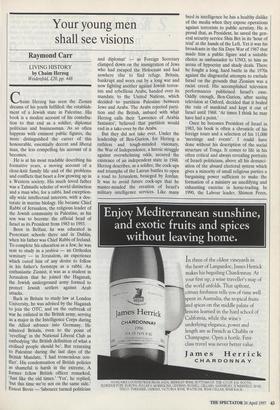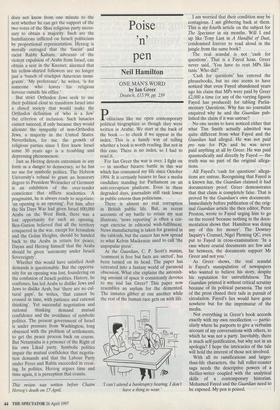Your young men shall see visions
Raymond Carr
LIVING HISTORY by Chaim Herzog Weidenfeld, £20, pp. 448 Chaim Herzog has seen the Zionist dreams of his youth fulfilled: the establish- ment of a Jewish state in Palestine. His book is a modest account of his contribu- tion to that end as a soldier, diplomat politician and businessman. As so often happens with eminent public figures, the more distinguished the career of this honourable, essentially decent and liberal man, the less compelling his account of it becomes.
He is at his most readable describing his formative years, a moving account of a close-knit family life and of the problems and conflicts that beset a Jew growing up in a Western society. His much loved father was a Talmudic scholar of world distinction and a man who, for a rabbi, had exception- ally wide intellectual interests, with a doc- torate in marine biology. He became Chief Rabbi of Jerusalem, the religious leader of the Jewish community in Palestine, as his son was to become the official head of Israel as its President from 1983 to 1993.
Born in Belfast, he was educated in Protestant schools there and in Dublin, when his father was Chief Rabbi of Ireland. To complete his education as a Jew, he was sent to study in a yeshiva — an Orthodox seminary — in Jerusalem, an experience which cured him of any desire to follow in his father's footsteps as a rabbi. An enthusiastic Zionist, it was as a student in Jerusalem that he joined the Haganah, the Jewish underground army formed to protect Jewish settlers against Arab attacks.
Back in Britain to study law at London University, he was advised by the Haganah to join the OTC, and on the outbreak of war he enlisted in the British army, serving as a major in the Intelligence Corps during the Allied advance into Germany. He admired Britain, even to the point of `revelling' in the National Liberal Club as embodying 'the British definition of what a civilised people should be'. But returning to Palestine during the last days of the British Mandate, 'I had tremendous con- flict'. His condemnation of British policies as shameful is harsh in the extreme. A former fellow British officer remarked, `Just like the old times."Yes', he replied, `but this time we're not on the same side.' Ernest Bevin — 'labourer turned politician and diplomat' — as Foreign Secretary clamped down on the immigration of Jews who had escaped the Holocaust and had nowhere else to find refuge. Britain, bankrupt and worn out by a long war and now fighting another against Jewish terror- ists and rebellious Arabs, handed over its mandate to the United Nations, which decided to partition Palestine between Jews and Arabs. The Arabs rejected parti- tion and the British, imbued with what Herzog calls their 'Lawrence of Arabia fantasies', believed that partition would end in a take-over by the Arabs.
But they did not take over. Under the leadership of Ben-Gurion, for Herzog a ruthless and tough-minded visionary, the War of Independence, a heroic struggle against overwhelming odds, secured the existence of an independent state in 1948. Herzog describes, as a soldier, the cock-ups and triumphs of the Latrun battles to open a road to Jerusalem, besieged by Jordan. It was to avoid future cock-ups that he master-minded the creation of Israel's military intelligence services. Like many bred in intelligence he has a healthy dislike of the media when they expose operations against terrorists to public scrutiny. He is proud that, as President, he saved the gen- eral security service Shin Bet in its 'hour of trial' at the hands of the Left. Yet it was his broadcasts in the Six Days War of 1967 that made him a public figure and a suitable choice as ambassador to UNO, to him an arena of hypocrisy and shady deals. There he fought a long, hard battle in the 1970s against the disgraceful attempts to exclude Israel on the grounds that Zionism was a racist creed. His accomplished television performances publicised Israel's case. Oddly enough, Ben-Gurion, after seeing television at Oxford, decided that it boded the ruin of mankind and kept it out of Israel until 1968. 'At times I think he may have had a point.'
Once he becomes President of Israel in 1983, his book is often a chronicle of his foreign tours and a selection of his 11,000 `meetings and events'. I could have done without his description of the social structure of Tonga. It comes to life in his often critical and always revealing portraits of Israeli politicians, above all his denunci- ation of the absurd electoral system which gives a minority of small religious parties a bargaining power sufficient to make the formation of a ministry an unedifying and exhausting exercise in horse-trading. In 1990, the Labour leader, Shimon Peres, does not know from one minute to the next whether he can get the support of the two votes of the Shas religious party neces- sary to obtain a majority. Such are the humiliations inflicted on Israeli politicians by proportional representation. Herzog is morally outraged that the 'fascist' and racist Rabbi Kahane, advocate of the violent expulsion of Arabs from Israel, can obtain a seat in the Knesset, alarmed that his yellow-shirted followers are no longer just a 'bunch of crackpot American immi- grants'. 'My preference', he writes, 'is for someone who leaves his religious fervour outside his office.'
But strict Orthodox Jews seek to use their political clout to transform Israel into a closed society that would make the Orthodox definition of 'who is a Jew' the criterion of inclusion. Such lunacies cannot succeed, if only because they would alienate the sympathy of non-Orthodox Jews, a majority in the United States. Nevertheless, for me, the growth of religious parties since I first knew Israel some 30 years ago is a troubling and depressing phenomenon.
Just as Herzog detests extremism in any form as a danger to democracy, so he has no use for symbolic politics. The Hebrew University's refusal to grant an honorary degree to President Weizaeker of Germany is an exhibition of the over-tender conscience that afflicts academics. A pragmatist, he is always ready to negotiate; `an opening is an opening'. For him, after the Six Days War had given Israel 800,000 Arabs on the West Bank, there was a lost opportunity for such an opening. Ben-Gurion believed that all the territory conquered in the war, except for Jerusalem and the Golan Heights, should be handed back to the Arabs in return for peace; Dayan and Herzog himself that the Arabs should be given 'autonomy under Israeli Sovereignty'.
Whether this would have satisfied Arab demands is questionable. But the opportu- nity for an opening was lost, foundering on the confusion of Israeli politics. History, he confesses, has led Arabs to dislike Jews and Jews to dislike Arab, but 'there are no cul- tural gaps', he writes, 'that cannot be crossed in time, with patience and rational thinking'. Yet successful negotiation and rational thinking demand mutual confidence and the avoidance of symbolic politics. The present government of Israel is under pressure from Washington, long obsessed with the problem of settlements, to get the peace process back on course. But Netanyahu is a prisoner of the Right of his own Likud party. Symbolic politics impair the mutual confidence that negotia- tion demands and that the Labour Party under Peres and Rabin succeeded in creat- ing. In politics, Herzog argues time and time again, it is perception that counts.
This review was written before Chaim Herzog's death on 17 April.



































































 Previous page
Previous page